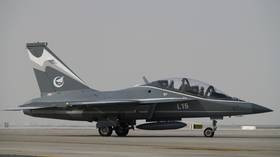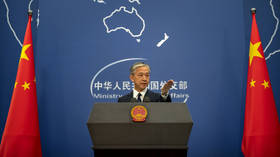China flexes military muscle near Taiwan

China’s People’s Liberation Army has deployed its Navy and fighter jets to the Taiwan Strait as part of fresh drills near the island which Beijing claims as its own. The latest show of force is meant as a “stern deterrent to the United States” after a group of five US lawmakers visited the island.
In a statement released on Monday, the Chinese military’s Eastern Theatre Command said it had conducted multi-service joint combat readiness patrols and combat exercises at sea and in the air in the vicinity of Taiwan.
The drills took place near Taiwan’s Penghu islands, which host a major air base.
Beijing shared footage of the island shot by military aircraft.
Chinese military officials insisted that by allowing the lawmakers to visit the island, the US effectively infringed on China’s sovereignty and territorial integrity. They accused Washington of threatening “peace and stability in the Taiwan Strait” with its “cheap political tricks.”
The Chinese military added that it “continues to train and prepare for war… and will resolutely crush any form of ‘Taiwan independence’ separatism and foreign interference.”
Taiwan’s Defense Ministry confirmed that 15 Chinese military aircraft had crossed the unofficial border in the Taiwan Strait.
Meanwhile, China’s Taiwan Affairs Office warned the Taiwanese leadership that they would be “severely punished” unless they “restrained themselves.”
Late on Sunday, a US congressional delegation consisting of four Democrats and one Republican arrived on the self-governing island. A representative for Senator Ed Markey (D-MA), who headed up the delegation, said that the group’s visit was meant to “reaffirm the United States’ support for Taiwan” as well as to “encourage stability and peace across the Taiwan Strait.”
Coming fast on the heels of US House Speaker Nancy Pelosi’s controversial visit to Taiwan on August 2, the most recent trip was far more low-key, as several media outlets pointed out.
There was no livestream of the lawmakers’ meeting with Taiwan’s President Tsai Ing-wen and other top officials, and footage was only released after the members of Congress had left the island on Monday afternoon.
It was Pelosi’s visit that precipitated a nosedive in what were already strained relations between Washington and Beijing. The House speaker’s having gone through with her plan to visit Taipei came despite repeated protests and warnings from China, which considered such a visit a violation of the ‘One China’ principle.
In response, the Chinese leadership launched “unprecedented” military exercises in the Taiwan Strait, which included the firing of ballistic missiles. Moreover, China suspended whatever trade relations it had with Taiwan and severed or downgraded its diplomatic ties with the US on a number of key issues, including climate change, maritime security, and areas of military cooperation.
China considers Taiwan an inalienable part of its territory. However, since 1949, it has been de facto independent after the losing side in the Chinese Civil War – the nationalists – fled to the island and established their own administration there. Taiwan is officially recognized by a little over a dozen nations, although the US is not among them. However, Taipei has long enjoyed close unofficial relations with Washington, and American lawmakers and officials regularly travel to the island. Yet, visits by more senior US figures are seen in Beijing as tacit endorsements of Taiwanese independence.













